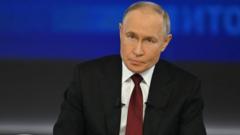In a landmark agreement, Papua New Guinea (PNG) will officially join Australia's National Rugby League (NRL) starting in 2028, a move widely interpreted as part of Australia's strategy to strengthen its influence in the Pacific against the backdrop of China's increasing presence in the region. The deal is reportedly accompanied by a commitment from PNG to prioritize its security partnership with Australia, sidelining potential agreements with other nations, particularly China.
Australia Leverages Rugby Alliance to Strengthen Influence in Papua New Guinea

Australia Leverages Rugby Alliance to Strengthen Influence in Papua New Guinea
Australia's National Rugby League (NRL) welcomes Papua New Guinea as a new team to foster regional ties and reduce Chinese influence.
Under the terms of the agreement, Australia will inject A$600 million (approximately US$384 million) over a span of ten years to establish the sport in PNG, which has a rich rugby league history. PNG's Prime Minister James Marape has hailed this deal as a "monumental opportunity" that aims to unify the diverse language and cultural groups within the country while also tightening ties with Australia. He remarked that this initiative will serve not just as a sporting endeavor, but as a catalyst for closer relations between the two nations.
Australian Prime Minister Anthony Albanese expressed his enthusiasm for the development, labeling it a "great day" for both Australia and PNG. Albanese stated that as the only nation where rugby league is the national sport, PNG "deserves" a place in the NRL. The addition of PNG marks the league's first expansion beyond its own borders, paving the way for greater international engagement.
This agreement, however, does not come without its complexities. Though it aims to herald a new phase in bilateral relations, it raises essential questions about PNG's autonomy in choosing security partnerships. While officials insist that Australia does not have a veto over PNG's international agreements, the implications of this deal could potentially limit PNG's diplomatic options, signaling a shift towards more transactional relationships in Pacific diplomacy.
As Australia competes with China for influence in the Pacific, this agreement reflects a broader strategy of combining sport with international policy in an unprecedented manner. Experts believe that drawing on PNG's cultural affinity for rugby can effectively open doors for businesses, educational exchanges, and collaboration on various issues such as climate change.
Despite acknowledging cooperation with China, PNG's leadership underscored the significance of aligning closely with Australia, particularly regarding security matters. Analysts view this orchestrated alignment as a critical juncture in the evolving dynamics of Pacific geopolitics, with rugby serving as an unexpected yet powerful diplomatic tool.
The forthcoming entry of a PNG team into the NRL serves as a notable example of how sports can function as a format for international relationships. Generally perceived as a cultural asset, this development is expected to reshape the contours of both countries' diplomatic interplay moving forward.
Australian Prime Minister Anthony Albanese expressed his enthusiasm for the development, labeling it a "great day" for both Australia and PNG. Albanese stated that as the only nation where rugby league is the national sport, PNG "deserves" a place in the NRL. The addition of PNG marks the league's first expansion beyond its own borders, paving the way for greater international engagement.
This agreement, however, does not come without its complexities. Though it aims to herald a new phase in bilateral relations, it raises essential questions about PNG's autonomy in choosing security partnerships. While officials insist that Australia does not have a veto over PNG's international agreements, the implications of this deal could potentially limit PNG's diplomatic options, signaling a shift towards more transactional relationships in Pacific diplomacy.
As Australia competes with China for influence in the Pacific, this agreement reflects a broader strategy of combining sport with international policy in an unprecedented manner. Experts believe that drawing on PNG's cultural affinity for rugby can effectively open doors for businesses, educational exchanges, and collaboration on various issues such as climate change.
Despite acknowledging cooperation with China, PNG's leadership underscored the significance of aligning closely with Australia, particularly regarding security matters. Analysts view this orchestrated alignment as a critical juncture in the evolving dynamics of Pacific geopolitics, with rugby serving as an unexpected yet powerful diplomatic tool.
The forthcoming entry of a PNG team into the NRL serves as a notable example of how sports can function as a format for international relationships. Generally perceived as a cultural asset, this development is expected to reshape the contours of both countries' diplomatic interplay moving forward.























